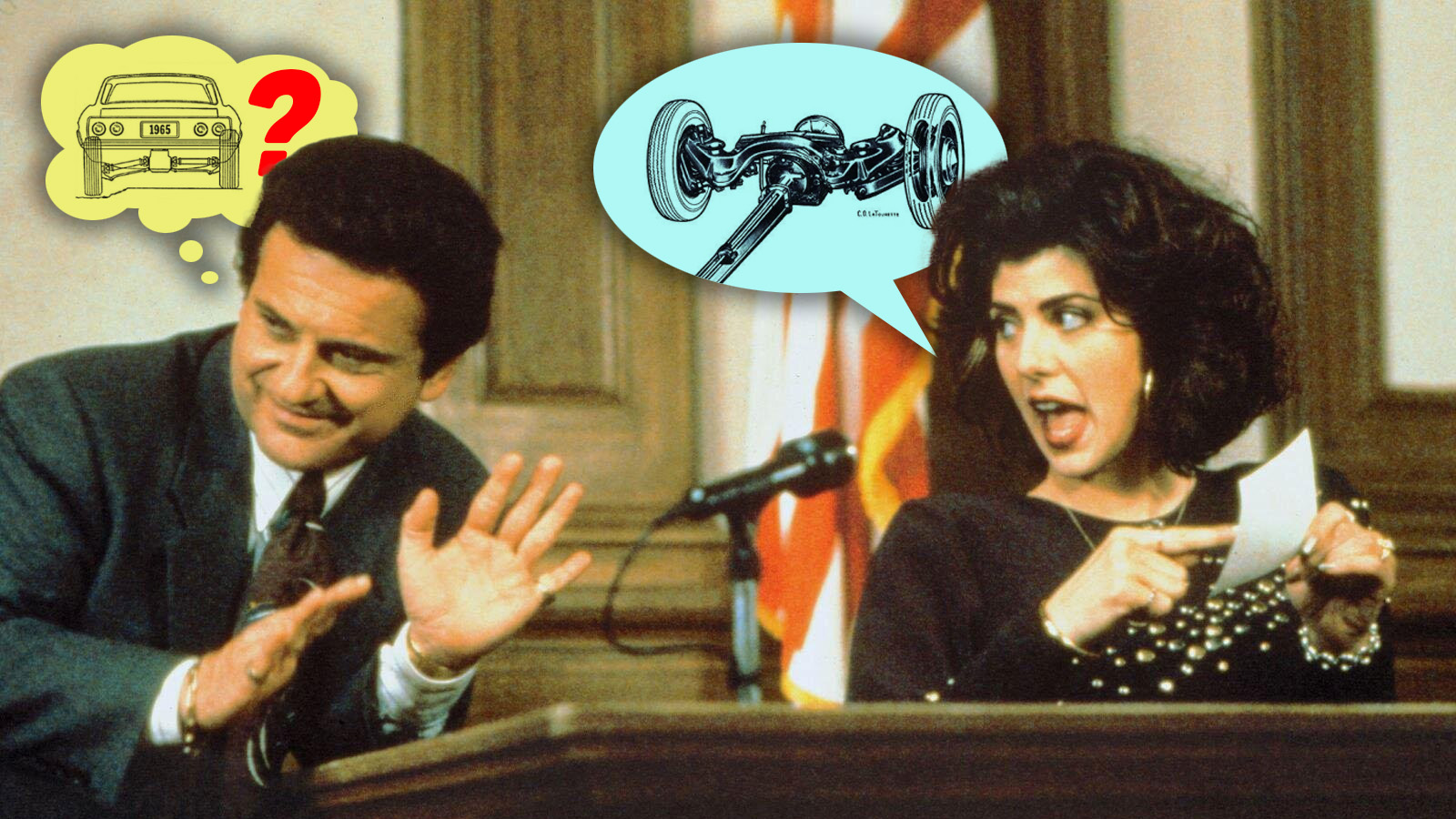If you had to pick a scene from a movie that almost every piston-happy gearhead likes, but stipulated, for your own perverse motives, that the scene must not include a car, then I suspect that there would only be one scene that would actually qualify: the courtroom scenes from My Cousin Vinny. For a scene that has zero actual cars in it, there is some genuinely hardcore car-ificating happening here. There’s a lot of fairly technical and geeky automotive discussion going on, and while it’s surprisingly accurate for a mainstream, mass-market comedy movie, there have been some out there who have noted some oversights. I want to look at the most common of these complaints, and actually try and figure out how much that matters.
Who’s with me? Fantastic. First, in case you’re unaware of the movie, here’s a quick rundown: it was a 1992 comedy that had a surprisingly high-stakes plot for a comedy: two college kids from New York driving to Los Angeles end up accused of a crime that could end in their, holy crap, executions. They’re too broke for an actual lawyer, so one of them calls their cousin, who is a new, inexperienced lawyer, the titular (giggle) Vinny.
Part of the case crucially hinges on evidence involving some skidmarks and tire treads. Vinny’s (Joe Pesci) fiancée, Mona Lisa, played delightfully by Marisa Tomei, happens to be an expert on cars, having grown up in a family of mechanics. Vinny needs her as an expert witness, and she’s greeted with skepticism by the court, which is, of course, pretty well steeped in the old marinade of chauvinism and a disbelief that women know jack about cars. The opposing lawyer tests her, of course:
Lisa passes that test with the confident aplomb of an astronaut. Her automotive knowledge is established here, especially for mid-century American cars. Later, we get to the crux of why Vinny wanted her there in the first place, as she is able to effectively destroy the primary piece of evidence via her evaluation of the tire marks and her knowledge of cars of the era:
It’s also worth noting that the woman-who-knows-a-lot-about-cars trope has been used in movies plenty before and since then, but I think My Cousin Vinny handles it with a lot more grace and charm than the usual inane, ham-fisted way it’s handled, which is where they get a woman to look at a car and then recite a whole paragraph of specs while all the dudes around nod in disbelief.
The 2014 Need for Speed movie did this especially eye-rollingly, with the hilariously-named Imogen Poots:
Oy. Terrible.
Anyway, let’s get back to Vinny; to prove Vinny’s cousin’s innocence, he needed to show that the car that was allegedly spotted and left the tire marks was not the 1964 Buick Skylark that his cousin drove. Lisa’s assessment of the tire tracks notes three important points: the Skylark did not have a limited-slip differential (the tire/skid marks left were of equal length, suggesting that both wheels received equal traction); the Skylark has a solid rear axle, and the tire marks, one of which was on a curb and the other not, could only be made by a car with independent rear suspension, as both are full tire tracks and not showing a partial/sidewall mark that a non-independent axle would have made; and finally, that the Skylark is about the same dimensions as a Pontiac Tempest, which had independent rear suspension and a limited-slip diff.
Oh, and they both could be had in the same GM minty green color.
Here’s a transcript of the scene, if we need to refer to it:
Mona Lisa Vito
The car that made these two, equal-length tire marks had positraction. You can’t make those marks without positraction, which was not available on the ’64 Buick Skylark!
Vinny Gambini
And why not? What is positraction?
Mona Lisa Vito
It’s a limited slip differential which distributes power equally to both the right and left tires. The ’64 Skylark had a regular differential, which, anyone who’s been stuck in the mud in Alabama knows, you step on the gas, one tire spins, the other tire does nothing.
Vinny Gambini
Is that it?
Mona Lisa Vito
No, there’s more! You see? When the left tire mark goes up on the curb and the right tire mark stays flat and even? Well, the ’64 Skylark had a solid rear axle, so when the left tire would go up on the curb, the right tire would tilt out and ride along its edge. But that didn’t happen here. The tire mark stayed flat and even. This car had an independent rear suspension. Now, in the ’60’s, there were only two other cars made in America that had positraction, and independent rear suspension, and enough power to make these marks. One was the Corvette, which could never be confused with the Buick Skylark. The other had the same body length, height, width, weight, wheel base, and wheel track as the ’64 Skylark, and that was the 1963 Pontiac Tempest.
Vinny Gambini
And because both cars were made by GM, were both cars available in metallic mint green paint?
Mona Lisa Vito
They were!
Vinny Gambini
Thank you, Ms. Vito. No more questions. Thank you very, very much.
Now, one of the biggest criticisms of her testimony is that it wouldn’t just have been the Corvette and Pontiac Tempest that could have had independent rear suspension and a limited-slip differential. There’s another car that could have had these traits: the Chevrolet Corvair.
The screenwriter of the movie, Dale Launer, seems to have known this, but didn’t think it’d matter. He told the website The Wrap in an interview:
“I thought, ‘Well, no one’s really going to know that. I can think of one person I personally know who would know that. Oddly enough, I had not seen him since high school, and I saw him at the premiere. He said [laughs], ‘You know, there were actually three cars with independent rear suspension.’”
Yes, the Positraction limited-slip diff (that name was just used for Chevys; other GM brands called it Positive Traction) was available on the Corvair, but I’m not so sure the rear-engined Corvair’s presence would have changed Lisa’s point, really. Well, depending on what year Corvair, I suppose. That’s because even though Corvairs always had independent rear suspension, early Corvairs used a swing axle design, which would have changed the tire marks of the raised tire:

So, a ’65 and up Corvair with the Positraction diff could be a suspect, but likely not the early ones. Which brings us to the Tempest.

The Tempest, while not rear-engined, did have a rear transaxle, and was also a swing-axle design; it was independent rear suspension, sure, but it would have left the same type of tire marks as the early Corvair if one tire was higher or lower: that tire would have only left a partial mark, unlike what was shown.
Also, the Tempest did not have an option for a limited-slip differential! This article on Curbside Classic, also evaluating this very same scene, noted that back in 2023. All of this means that the Tempest really wasn’t a viable option to have left those tire marks after all.
The issues about the slightly different wheelbases and sizes of the Tempest vs. the Skylark I don’t think really matter; they’re within inches of one another, and are both fairly conventional-looking three-box sedans (or convertibles, in this case). Witnesses weren’t rushing over with tape measures or anything.
While these errors may sound devastating to Lisa’s testimony, I don’t actually think they were. Her fundamental assessment still stands and is still just as accurate as ever: the car that left those marks must have had an independent rear suspension and a limited-slip differential. Her evaluation of that was spot-on.

From there, all that really needs to happen is that the ’64 Skylark of the accused kids needs to be shown to not have those features. It definitely has a solid axle, so there goes the independent suspension part, and the Positive Traction differential was an option (and I don’t really think all that common, either), so as long as the court can be shown that the Skylark has neither of those things, they should be off the hook!
So, let’s recap here. While the main critiques of Mona Lisa Vito’s expert witness testimony are valid – the Pontiac Tempest was really not a viable suspect, while a later Corvair with the later double-jointed rear suspension and Positraction differential was – they really don’t change the most important point of the testimony, which is that the 1964 Skylark could not have left those tracks.
Even with these caveats, the scene remains one of the more technically accurate bits of automotive exposition in a movie, especially a non-car-focused movie. It’s not 100% accurate, but it’s still a great scene.









I love that movie…what a beautiful actress. I also love the whole Seinfeld bit
“GEORGE: (animated) Fixed up? A cup of coffee! A cup of coffee is not a fix
up!
ELAINE: You wanna meet her. You wanna see if she likes you?
GEORGE: (defensive) So what? So what if I do?
ELAINE: (shrill) You’re engaged!
GEORGE: (worked up) I’m aware! I’m aware!! But this is Marisa Tomei, Elaine.
An Oscar winner! How can I live the rest of my life, knowing I coulda been
with Marisa Tomei? She said I was just her type! She loves short, stocky,
balding funny men!
What would be the correct ignition timing be on a 1955 Bel-air Chevrolet with a 327 cubic engine and a 4-barrel carburetor.
I’m a lawyer, and while not a litigator, I can tell you that litigators love that movie. Vinny does a textbook job of leading the witnesses through their testimony. It’s beautiful from a trial practice perspective. Legal Eagle has a great video on how much he as a lawyer loves this movie.
I just watched that scene last night! I hated the “test” the lawyer gave her. Anyway, could Corvair actually have left those burnout tracks? With a fairly low power, and the engine in the rear giving great traction, I just don’t see it as fathomable.
That’s what I was thinking. I don’t think a Corvair would’ve been likely to be capable of doing a burnout, considering the highest output engine made a whole 140 horsepower, and with the weight of the engine over the rear wheels, breaking traction would have been even more challenging.
I have done burnouts in less and usually not intentional. Think bias ply tires that are old and hard with not a lot of tread left on a very hard road surface.
The timing setting test? Because that’s the most implausible thing about car stuff in the movie.
It’s pretty crazy that 2 of the best courtroom movies, My Cousin Vinny and A Few Good Men came out the same year in 1992. And it’s even crazier that no one has tried to splice the two together, with Vinny cross examining Col. Jessup, or Lt. Kaffee up against Judge Haller or Mona Lisa!
The valid critiques of that scene completely miss two important points.
1. My Cousin Vinny is a work of fiction and a comedy. Did you like the movie? Did you laugh when Joe Pesci ran out of the cabin at midnight and randomly fired a pistol because a tiny screech owl was driving him crazy? Then the movie did its job.
2. Marissa Tomei. Good god, Marissa Tomei. If you know you know.
The most unbelievable part of “My Cousin Vinny” was how a schlub like Vinny had a gorgeous and intelligent girlfriend like Mona Lisa. She is also a better lawyer than him (despite not being a lawyer at all).
It was all down to the scotch tape holding his face in position, chicks love that. I rewatched it recently and couldn’t stop noticing.
They thankfully were playing characters closer in age than their actual ages (she was like 31 and he was 48), both being in their 30s.
But in my head cannon, where they grew up there were a lot of good looking creeps, and Vinny wasn’t one of them. He treated her well, respected her intelligence and love her to bits.
Possibly my favorite line in ‘My Cousin Vinny’ was when Vinny’s responding to the opening statements with ‘Everything that guy just said is bullshit.’
It’s very possible that this has become my own response to almost anything in real life to give myself time to accurately assess things before giving a real response
I absolutely love this scene… so good
The tomboy car girl trope that I found least believable back then was the French exchange student in 1985s better off dead, who restores a 67 Camaro. It just seemed to forced that the probably small number of 1980s French girls into old American cars just happens to live near a weird boy who has one needing fixed. I know it is fiction, it struck me as a stretch, and I dated a french exchange student a few years later.
Keep in mind, that car (in that condition) was purchased for TWO HUNDRED DOLLARS.
I have said it before and I’ll say it again. My Cousin Vinny, and The Hurricane are very similar movies albeit one it a comedy and one a drama. They both come down to a court room where car designs and features are discussed.
I watched a standard tire chart seemingly provided by the police used in court to establish speed of a motorcycle.
I don’t know when the chart was done, but I don’t think it included motorcycles at all.
Multiple issues, but admitted in court.
It iw quite possible that My Cousin Vinny is the movie I have watched more than any other. When in college it was on some cable channel or another basically every other day. The entire house of guys I lived with could basically recite the entire thing from start to finish.
Everybody in the grit eating world better listen to Mona Lisa Vito.
Love how deep this breakdown goes into the automotive details of My Cousin Vinny! It’s amazing how much precision and focus goes into analyzing something like tire marks — almost like how athletes or professionals push their bodies to the limit. After long hours of detail work (or even a day at the track), I’ve found a good massage is the perfect way to recover and recharge. On my last visit to Daegu, I tried Honeyroom Massage, and it really helped melt away all the tension. Highly recommend it for anyone who needs to reset after high-intensity days!
My wife and I were watching MCV just last night!
My husband and I were talking about this scene a couple of days ago. There were swerving tire tracks on the country road we were driving on. I commented how someone had a lot of fun and he said how the car had positraction and started explaining it to me. And I was like, “I KNOW WHAT IT IS, I’VE SEEN THE MOVIE.”